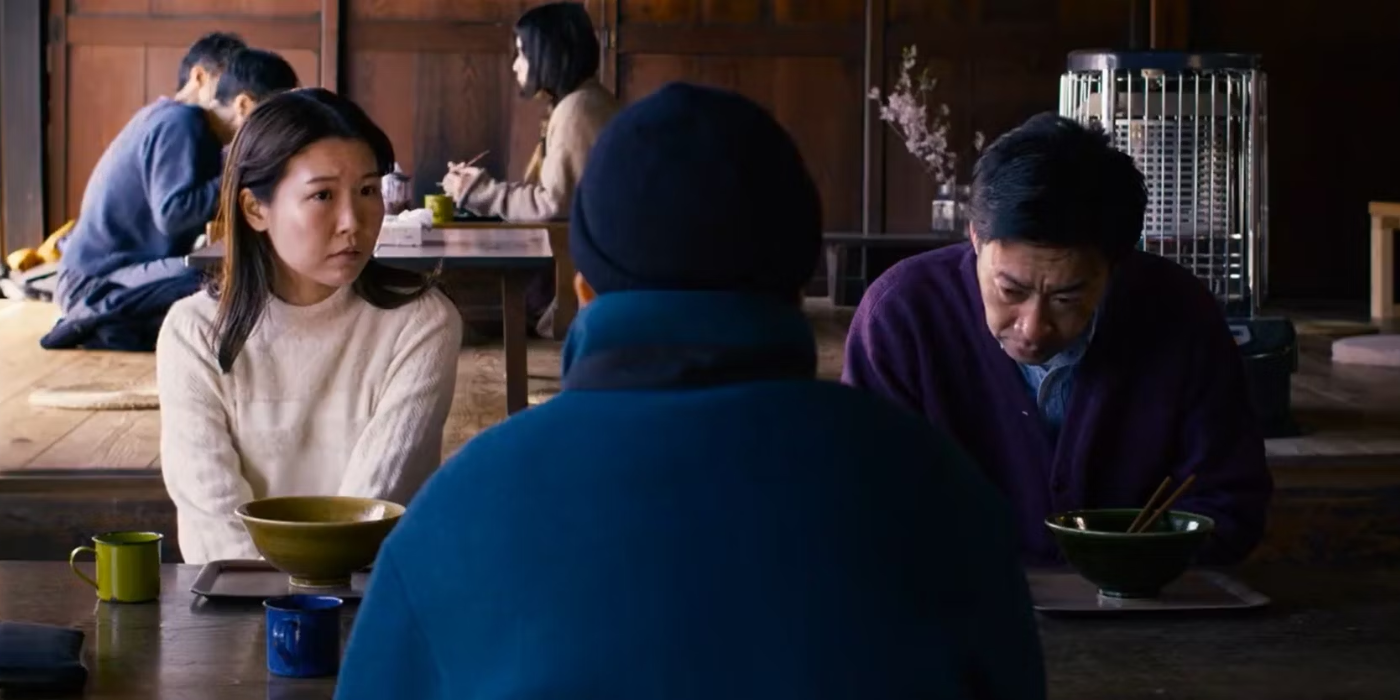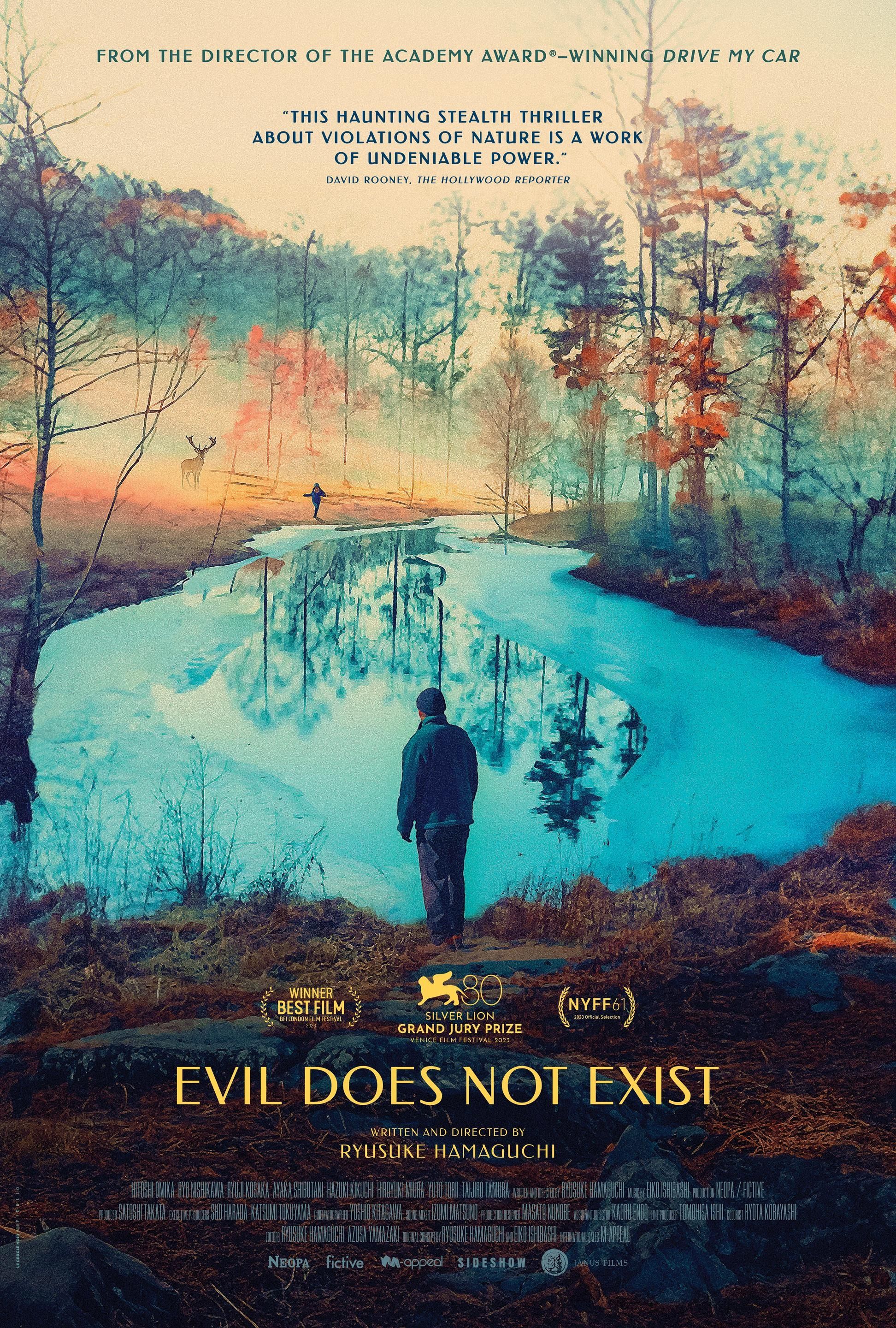The Big Picture
- Evil Does Not Exist prioritizes mood over plot, showcasing nature's beauty and the importance of listening.
- The clash between a company and a community highlights ecological problems and flawed business models.
- Director Ryusuke Hamaguchi scales back to create a simple yet elegant film, emphasizing visuals and music.
This review was originally part of our coverage for the 2023 Toronto International Film Festival.
Ryusuke Hamaguchi, the writer-director behind such recent gems as Drive My Car and Wheel of Fortune and Fantasy, originally intended his latest film, Evil Does Not Exist, to be a series of silent visuals that would accompany new music from his Drive My Car composer Eiko Ishibashi. At the beginning of Evil Does Not Exist, it’s easy to think that’s exactly what we are going to see, as Ishibachi’s score plays over Hamaguchi’s shots of snow-covered trees under a gorgeous sky. The opening shot lasts almost too long, and the music comes to an abrupt stop, as if Hamaguchi is assuring us that Evil Does Not Exist will be more than just an accompaniment to another beautiful Ishibashi score.
Yet Hamaguchi never strays too far from this original idea in Evil Does Not Exist, as we follow Takumi (Hitoshi Omika)—a jack-of-all-trades in the small Mizubiki Village outside Tokyo—and his daughter, Hana (Ryo Nishikawa). The pair quietly collect water and Takumi cuts wood for several minutes. It’s an extremely quiet intro, where the most surprising thing that happens is the discovery of a wasabi plant, which will be harvested for a nearby noodle shop.
Evil Does Not Exist (2024)
A thought-provoking film weaves together the lives of several individuals facing moral dilemmas in a conflict-ridden region. As each person confronts the darkness within and the societal pressures around them, the story challenges the notion of inherent evil, questioning whether bad actions or circumstances dictate one's fate.
Release Date April 26, 2024
Director Ryusuke Hamaguchi
Cast Hitoshi Omika , Ryô Nishikawa , Ryûji Kosaka , Ayaka Shibutani , Hazuki Kikuchi , Hiroyuki Miura , Yoshinori Miyata , Taijirô Tamura
Runtime 106 Minutes
Main Genre Drama
Writers Ryusuke Hamaguchi , Eiko Ishibashi
Budget 0.0
Studio(s) Neopa , Fictive
'Evil Does Not Exist' Is Intentionally Slow—and That's What Makes It Wonderful
But like he did with Drive My Car, Hamaguchi makes the silent, deliberate moments essential to his story. As we get to explore the woods with Takumi and Hana, we are shown the beauty of the natural resources, the peacefulness of this community, and the reliance on nature for their way of life. Hamaguchi is building this world by pulling back, letting us meditate in the area and see the wonders that these people see every day—an essential element for what’s to come.
After setting up this land, Evil Does Not Exist primarily focuses on a company and its two representatives (Ryuji Kosaka and Ayaka Shibutani) who come to the area in order to discuss their plans to build a glamping retreat on the land. Almost immediately, the people of the land realize the problems with the plans: their septic tanks will pollute the nearby water, deer will be able to jump into the glamping area, and a lack of employees means guests will be largely unsupervised to do whatever they want. As the people push back against the company, its two representatives begin to see the flaws in the business model and spend time in the area to understand what their company hasn’t seen.
But beyond just seeing this land, its beauty and importance, Hamaguchi puts a face to this conflict in Hitoshi Omika’s Takumi. In a perfectly restrained performance that never undercuts the large emotions at play, Takumi first helps us see the wonders of this area from his perspective, a land that he clearly loves, but is also integral to his way of living. Takumi is a man of few words, but we can see the love on his face as he walks the woods, but also the seething anger that he’s trying his best to hide when he learns that these same woods could be taken away from him. Takumi is our guide through the shifts in this story, and by doing so little, Omika makes us feel every emotion that the people of this land are struggling to deal with.
Evil Does Not Exist is a largely quiet, contemplative film that often feels more like an attempt to create a mood than it is reliant on any plot. We watch as Takumi and Hana explore the land, we see the company confront the people of Mizubiki, and then Takumi and Hana once more show the two representatives the land—who wonder at the area they may be building over. Hamaguchi takes a nuanced approach to both sides and never makes the encroaching company the “villain,” even if we do understand their plan is deeply flawed. Hamaguchi is seemingly trying to show how such ecological problems can often be solved by listening and understanding the land, but this never feels like the focus to the point of overrunning the quieter ambiance of the film.
'Evil Does Not Exist' Has an Ending That Sticks Out

Because of this, the way Hamaguchi decides to end Evil Does Not Exist seems particularly odd, a surprising action that seems out of line with the rest of the film. This isn’t a sort of Jeanne Dielman approach, but rather, almost like Hamaguchi doesn’t know how to quite end this film that hasn’t relied on story all too much. It’s a small jolt that feels out of place with the tone that Hamaguchi has shown us so far.
Yet it’s this approach to such an important story about this land that makes the more combative moments even more powerful. As those who live in Mizubiki come at odds with those trying to develop on the land, it feels almost like a jolt in this relatively silent world. These people come here for that silence, and with these outsiders coming in, they must be loud and fight for what they love. It’s as though nature is fighting back, pushing against those that would do it harm—even if they don’t realize how much harm they’re truly doing. As with the ending, these moments where the people face off against this company are so overwhelming simply because of how toned-down Hamaguchi has made the rest of the story surrounding these moments.
But Evil Does Not Exist might be most fascinating in that this is how Hamaguchi decided to follow up his Oscar-winning Drive My Car—not by crafting something bigger and using his newfound popularity to push for larger opportunities. Rather, Hamaguchi has scaled back even further, making something simple, yet elegantly told. Its more of an experiment than an actual narrative, and the result is quite beautiful, albeit still a bit minor comparatively.
'Evil Does Not Exist' Lets the Score and Visuals Take Over

If anything, by not focusing so much on an actual story, Hamaguchi allows for the other aspects of the filmmaking to shine through. Naturally, Ishibashi’s score becomes the centerpiece of the story, playing over gorgeous imagery, then cutting out in shocking fashion when we’ve finally been lulled into the sense of security it offers. As previously mentioned, Hamaguchi originally intended this to be all about the visuals, and he still accomplishes that with the help of Yoshio Kitagawa’s stunning cinematography. The way he’s able to frame these walks through the woods is compelling in its own right, and watching something as simple as the snow drift away while Takumi cuts a piece of wood is captivating.
Hamaguchi’s Drive My Car worked so beautifully because of the smaller, quiet moments of life, the drives from one place to the next, and the undiscovered moments that we keep hidden. Evil Does Not Exist turns these moments into an entire feature-length film, and while it might seem slight at times, the approach is wonderful in its own right—a master filmmaker taking his time and embracing the silence. After a Best Picture nomination, most filmmakers wouldn’t head in this direction, but it’s wonderful that this is where Hamaguchi decided to go next.

REVIEW
Evil Does Not Exist (2024)
Evil Does Not Exist is a quiet, reflective eco drama with sharp filmmaking and an ending that challenges its audience.
Pros
- The film takes a slow approach that also makes it wonderful.
- As we come to understand all the characters, it brings a refreshing nuance to a critical subject.
- The visuals and score are magnificent, making it an experience that takes the breath away.
Cons
- The ending does stick out as a bit odd and out of place from what preceded it.
Evil Does Not Exist is now available to stream on VOD in the U.S.









 English (US) ·
English (US) ·